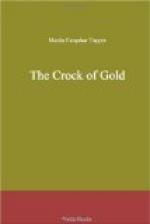It was astonishing how innocently the worthy couple laughed together.
“My only trouble, Aunt Quarles, is where to keep my gains—what to do with them. I am quite driven to the strong-box system, interest is so bad; and as to speculations, they are nervous things, and sicken one. I invest in the Great Western one day—a tunnel falls in, so I sell my shares the next, and send the proceeds to Australia; then, looking at the map, I see the island isn’t clean chalked out all round, and beginning to fear that the sea will get in where it a’n’t made water-tight by the Admiralty, I call the money home again. You see I don’t know what to do with gold when I get it. Where do you keep yours now, aunt, I wonder?”
“O, Nep, never mind me; you rattle on so I can’t get in never a word. I’ll only tell you where I don’t keep it. Not at Breakem’s bank, for they’re brewers, and hosiers, and chandlers, and horse-dealers—ay, and swindlers too, the whole ‘company’ on ’em; not in mortgages, for I hate the very smell of a lawyer, with all his pounce and parchment; not in Gover’me’t ’nuities, for I’m an old ’ooman, boy; and not in the Three per Cents, nor any other per cents, for I’ve sense enough to know that my highest interest lies in counting out, as my first principle is dropping in.” And the fat female laughed herself purple at the venerable joke.
Simon was a courtier, and laughed too, as immoderately as possible.
“Ah! I dare say now you have got a Chubb’s patent somewhere full of gold?” he asked somewhat anxiously; “take your punch, aunt, wont you? I do not see you drink.”
“Simon, mark me; fools who want to be robbed put their money into an iron chest, that thieves may know exactly where to find it; they might as well ticket it ‘cash,’ and advertise to Newgate—come and steal. I know a little better than to be such a fool.”
“Yes, certainly—I dare say now you keep it in your work-box, or sew it up in your stays, or hide it in the mattress, or in an old tea-pot, maybe.” And Jennings eyed her narrowly.
“Nephew, what rhymes to money?”
“Money?—Well I can’t say I am a poet—stony, perhaps. At least,” added the benevolent individual, “when I have raised a wretch’s rent to gain a little more by him, stony is not a bad shield to lift against prayers, and tears, and orphans, and widows, and starvation, and all such nonsense.”
“Not bad, neither, Nep: but there’s a better rhyme than that.”
“You cannot mean honey, aunt? when I guessed stony, I thought you might have some snug little cash cellar under the flags. But honey? are you such a thorough Mrs. Rundle as to pickle and preserve your very guineas, the same as you do strawberries or apricots in syrup?”
“Oh, you clever little fool! how prettily you do talk on: your tongue’s as tidy as your cash-book: when you’ve any money to put by, come to Aunt Bridget for a crock to hide it in: mayn’t one use a honey-pot, as Teddy Rourke would say, barring the honey?”




